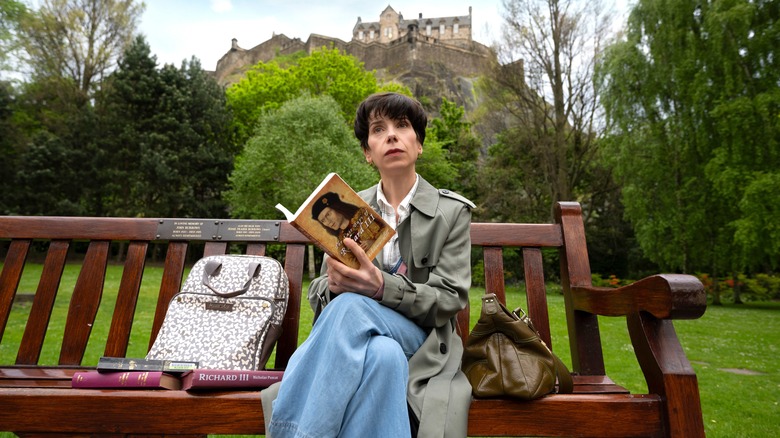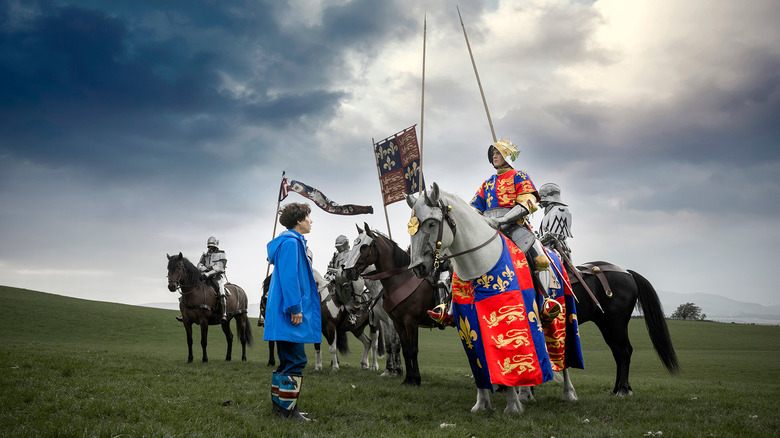The Lost King Review: Stephen Frears' New Film Seeks To Change The Record On Richard III [Austin Film Festival]
You're probably familiar with the old saying "History is written by the victors." A more accurate sentiment would be "History is written by the conquerors." Those that end up on top have the desire to justify and celebrate their conquering, and if that story gets passed along through time, it becomes an accepted fact rather than a propagandistic perception. Only in the last few years has there been major pushback from folks of all stripes on the historical perception of Christopher Columbus, who for hundreds of years has been hailed as the founder of the "New World," which isn't true at all. Most stories need heroes, and if you've silenced those who oppose you, you can claim to the hero yourself.
This correcting of the record is at the core of the story of Philippa Langley, a woman who spearheaded an archaeological dig a decade ago in search of the remains of King Richard III. Though we best know this historical figure through his depiction as the archetypal Machiavellian baddie by a little-known playwright known as William Shakespeare, the real man had very little in common with the hunchbacked murderer we see on stage, though he did suffer from scoliosis. His nefariousness and status as a usurper had been the position of the Tudors for centuries, put in place to legitimize their power and solidify Henry VII as the apparent rightful heir to the throne.
Langley's quest to clear Richard's name and deliver him a proper royal burial is brought to us by the re-teaming of director Stephen Frears and screenwriters Steve Coogan and Jeff Pope for "The Lost King," called that because I assume Al Pacino's 1996 documentary "Looking for Richard" caused a copyright issue. The three previously came together nearly a decade ago for "Philomena," another story about a woman in search of a man (in that case the son she was forced to put up for adoption 50 years earlier). That Best Picture nominee was a sweet-natured dramedy and a cut above the standard human interest, true story films that we often see made in the UK. "The Lost King" basically falls within the exact same space, delivering a perfectly nice tale of a woman fighting the establishing that is bolstered by the always captivating Sally Hawkins in the lead role.
The fundamentals of want vs. need
At the start of "The Lost King," Philippa Langley has been passed over for a promotion at work for a woman much younger than her who hasn't worked at the company for a significant amount of time. Langley suffers from myalgic encephalomyelitis, also known as chronic fatigue syndrome, and despite her never letting that get in the way of her work and life, she is perceived to be weak and not as capable of handling major responsibilities, preventing her from receiving the proper respect and celebration she deserves for her efforts. Upon seeing a production of Shakespeare's "Richard III," where an actor played by Harry Lloyd (best known as Viserys Targaryen in "Game of Thrones"), Langley finds a kindred spirit in the misunderstood king and joins the Richard III Society, whose goal is to dispel the Tudors' version of the man.
The paralleling of Philippa and Richard is thuddingly obvious. They both are people defined by and looked down upon for their medical ailments, unable to receive the proper grace they deserve in the world. In drama, every protagonist has a want and a need. The want is the thing the character is actively searching for, and the need is the thing they actually require for their quest to be fulfilling, even though they never realized it. In this case, Philippa's want is to find the missing remains of Richard III, but her need is to be commended by others for her achievements. Because of this blatant connection between the two figures, which becomes even more explicit in the frequent conversations she has with a vision in her head of Richard (also played by Lloyd), the want and need are so closely linked that there isn't much dramatic friction in the story. At times, she is even aware of her own need, which kind of goes against the whole principle.
However, that doesn't stop her research and determination to find this grave from being compelling. Few actors working today have a better handle on playing someone utterly vulnerable and fragile on the surface who has a bursting, quiet strength driving her every move than Sally Hawkins. She makes it so easy to root for Philippa. This character could so easily turn into a manic obsessive that distances the audience from her, but Hawkins' rendering of desperation could not be more human. Plus, she has such a light touch as an actor that she can just as easily get a laugh.
Creating its own historical fiction
"History is written by the conquerors" may be the sentiment Philippa Langley's story seeks to break, but "The Lost King" is just as guilty of it too, though to a much smaller degree of course. Philippa is the winner here. She is the hero. Thus, there needs to be a villain, which this film decides to be Richard Taylor (Lee Ingleby) from Leicester University. While I have no doubt that academic circles doubted and pushed back against Langley in her beliefs about Richard III considering she was a fairly amateur historian, the degree to which "The Lost King" portrays them as two-timers out to railroad her at every turn is downright comical. It's like Clint Eastwood's "Sully," where the standard checks and balances of an institution are depicted as a personal affront to the protagonist. Yes, it adds to her underdog status and desire to be properly recognized, but you cannot shake the irony of the whole film being concerned with accuracy and fairness.
Around the middle of the movie, Philippa and her ex-husband John, played by co-writer Steven Coogan, discuss what she hopes this whole journey to expose the truth about Richard III will do. She hopes that people we see him as a human. Not a saint, not a demon, but a human being who was complicated. "The Lost King" itself doesn't really take that same approach. There are clear good guys and bad guys at every turn. This isn't a very nuanced look at humanity.
However, that doesn't mean it's an unsuccessful film. As a piece of investigative entertainment, it's quite a good time. If you're looking for the version of this story that debates the morally gray figures of history, you are looking in the wrong place. The aim of "The Lost King" is to shine a light on a plucky, intelligent woman who the world cast aside, but she persevered despite the forces against her. The bar it needed to reach was "Perfectly charming," and that's where it landed.
/Film rating: 6 out of 10


